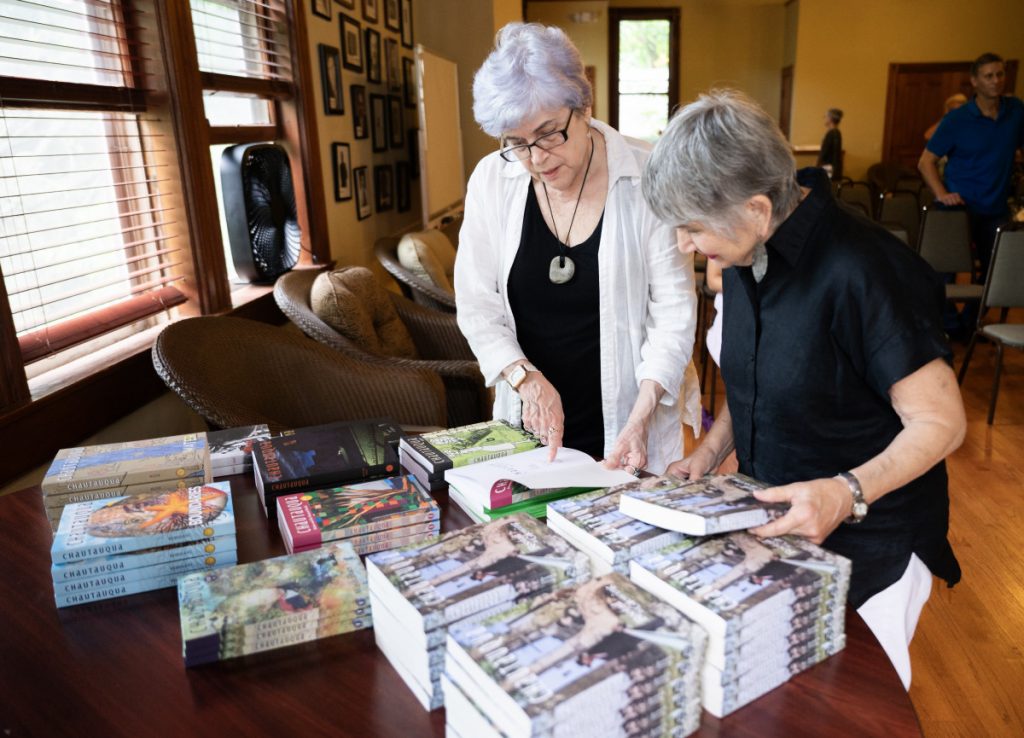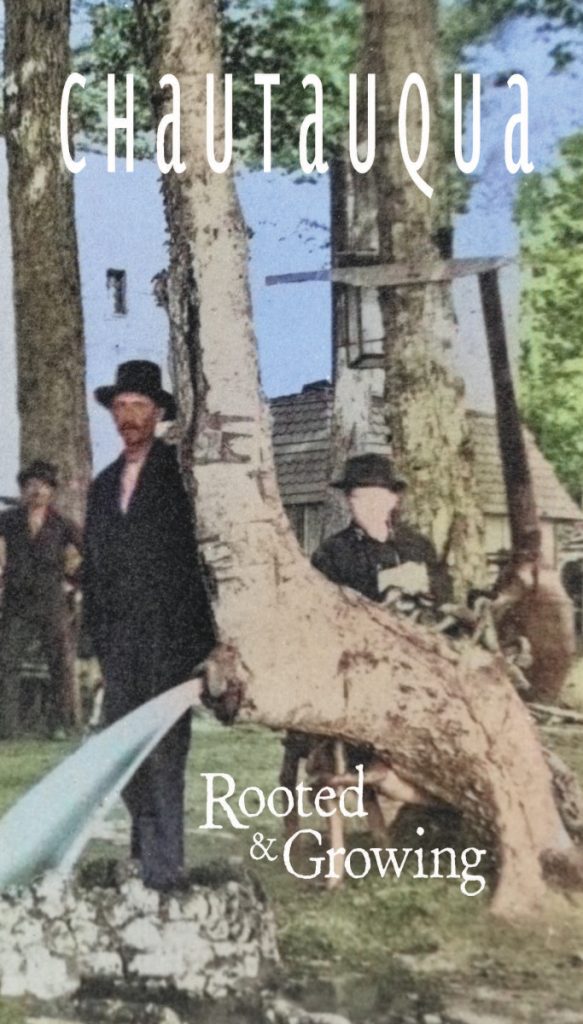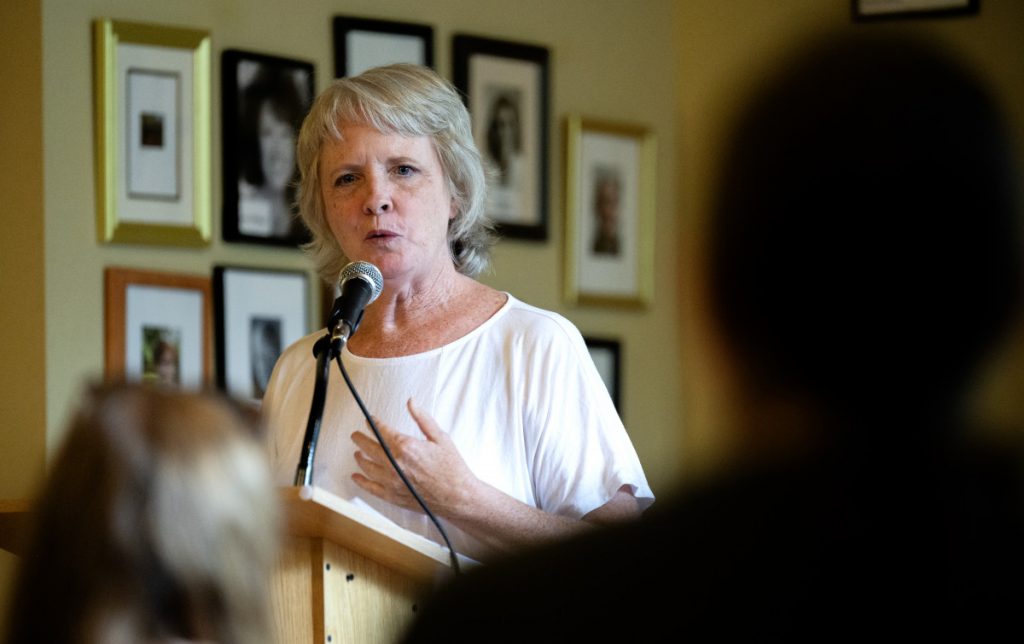
The journal’s advisory editor Diana Hume George, left, looks through past editions of the journal with Chautauquan Georgia Court.

This past Monday, Chautauqua Literary Arts and community members celebrated the legacy of the literary journal Chautauqua and the editors who have overseen its publication for more than 15 years.
With a dedicated group of writers and Chautauquans gathered in the ballroom of the Literary Arts Center at Alumni Hall, the event “Celebrating a Legacy: The Chautauqua Journal & Anthology” opened with a keynote from Chautauqua editor Jill Gerard.
When she and her late husband, Phillip, were approached on their wedding day with the offer to become editors of the journal, she said he gave the soundest response one could give: Of course, and — channeling his inner Don Corleone from “The Godfather” — paraphrased the famous Marlon Brando line with “You come to me on my wedding day!”
It was an offer the couple couldn’t refuse, which meant their “I Do’s” were followed by another “yes,” as they accepted the job.
The Gerards began their editorship in 2007, and the journal joined forces with the Department of Creative Writing at the University of North Carolina Wilmington, where the couple’s ties ran deep. Phillip was department chair of the MFA program there for seven years; Jill a lecturer.
“We were asked if we could make (the journal) more fully represent Chautauqua, and that’s what we did,” said Jill Gerard during her keynote at Monday’s event. “We elected to do a theme, so it’d be like a week (at Chautauqua), and we elected to honor the core pillars, because imagine the world if everyone lived by the four pillars (arts, education, religion and recreation). It would be a different space. That was our goal and we were happy to do that.”
Separating the journal into these sections became customary for every subsequent edition of Chautauqua, published through UNC-Wilmington, where undergraduate and graduate students can take a class that allows them to oversee and manage the journal’s annual publication as they dip their toes in the publishing world. With over 300 submissions per reading period, the students are in charge of vetting them, revising them, and deciding what section each piece belongs in thematically. The students also brainstorm ideas in a collaborative process, previously with both Gerards, and now with Jill.
“We read endless submissions, and we read them with respect. We learn to describe our experience in reading them, not whether we like them or not, but whether they’re working,” said Jill Gerard. “That’s a huge shift in how a person reads, and it’s a huge shift in how a person thinks and learns. … We are committed to finding art.”
For the journal’s 2024 edition, the team decided to reprint Phillip’s original introduction to the first Chautauqua he co-edited, published the summer of 2008. The piece is titled “Chautauqua: A Moveable Feast,” and both Jill Gerard and her students agreed that it beautifully captures the history of Chautauqua, and has driven the vision of the journal ever since.
The essay’s closing reads: “Reading poems and stories and essays is like that — a profoundly individual and private experience but also one that carries a reader into the great stream of literature, a shared experience after all.”
“What I believe in, and what Phillip also believed, was this special community,” said Jill Gerard. “This literary community is dedicated to literary citizenship, where we respect and hold each other up. It’s the only reason I’ve done it all these years, and it’s the only reason I look forward to continuing on.”

Following her keynote came the formal, official announcement for the future of the journal. The 2024 edition of Chautauqua, themed “Rooted & Growing” in honor of the Institution’s sesquicentennial, is the journal’s final publication in its current form. The journal is transitioning to an anthology, initially sold exclusively on the grounds in 2025, and then in bookstores across the nation that autumn. At the helm of this expansion is Jill Gerard herself, serving as co-editor with Kwame Alexander, the Michael I. Rudell Artistic Director of Literary Arts and Inaugural Writer-in-Residence at the Institution.
As part of the celebration, writers and Chautauquans Fred Zirm, Bryn Grey, Tom Greier, Clara Silverstein and Jana-Lee Balish-Germaine read their own work that’s been featured in the journal over the years. Diana Hume George, who currently is the journal’s advisory editor and formerly one of the co-directors for what was at the time called the Chautauqua Writers’ Festival, featured works from Luciana Bohne, Richard Lenhert and Mary Jane Kidd. Manager of Literary Arts Stephine Hunt and Jill Gerard also shared remarks on behalf of some writers published in the 2024 issue.
“We’re so happy to bring your work into the world and we hope that the readers find meaning there,” Jill Gerard said of those gathered who have had writings published in Chautauqua. “We’re an important community and we can save this world. Keep at it and get the word out.”




